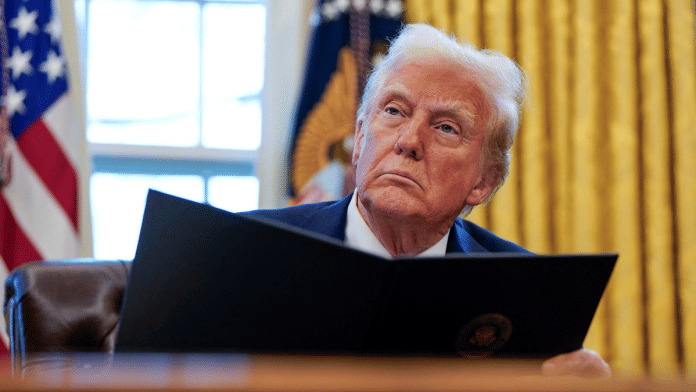New Delhi: In what could be a potential setback for India’s connectivity projects with Central Asia, US President Donald Trump has directed his administration to “modify or rescind” sanction waivers for the Chabahar Port project in which India has a stake.
It was in November 2018 that India received a sanction waiver for the port project from Trump during his first term.
Only last year, India and Iran, after ironing out several legal issues, signed the 10-year port deal that would allow the state-owned India Ports Global Private Limited to manage and operate a terminal in Iran’s Chabahar.
Now, ahead of PM Narendra Modi’s potential White House visit that could happen as early as next week, Trump has ordered his administration to apply “maximum pressure” on Iran to “end its nuclear threat, curtail its ballistic missile programme and stop its support for terrorist groups”.
“The Secretary of State shall modify or rescind sanctions waivers, particularly those that provide Iran any degree of economic or financial relief, including those related to Iran’s Chabahar port project,” said the ‘National Security Presidential Memorandum’ executive signed by Trump.
Chabahar is a strategic asset for New Delhi as it would allow access to Afghanistan by circumventing Pakistan.
India earlier received a narrow waiver on the Chabahar port from Washington D.C. due to its importance in the reconstruction and economic development of Afghanistan in November 2018.
However, now, the Taliban are back in power in Afghanistan. Though India does not recognise the Taliban regime, it maintains a technical mission in Kabul.
During the only call between Modi and Trump after the latter’s official inauguration, the US President urged India to ensure “fair” trade and check the illegal migration of Indians to the US. He urged India to purchase more American-made security equipment, too.
Now, the issue of the sanctions waiver around Chabahar is likely to figure in talks between Modi and Trump going forward.
The US President, during his first term (2017-2021), applied a strategy of “maximum pressure” on Tehran after walking out of the Joint Comprehensive Plan of Action (JCPOA).
The JCPOA was an agreement struck between Tehran and a number of Western nations under President Barack H. Obama to limit Iran’s nuclear programme in exchange for sanctions relief.
From August 2018 till the end of his term in 2021, Trump had introduced over 1,500 new sanctions on Iran.
Chabahar—India’s main economic link to Iran
India has largely fallen in line with US sanctions on Iran since 2018 by reducing its purchase of Iranian oil. In 2018-2019, India imported roughly $13 billion worth of goods from Iran. Of that, roughly $12.37 billion was for oil and its derivatives. Since 2019-2020, India has imported less than $1 billion worth of goods from Iran.
Between April 2024 and October 2024, India’s total imports from Iran stood at $216 million, which indicated its continued compliance with the US sanctions on Tehran since Trump walked out of the JCPOA in 2018.
However, if the US State Department rescinds the narrow waiver given to India, it could hugely impact the remaining economic linkages between New Delhi and Tehran.
In January, a senior Iranian official hoped that new economic opportunities could be found between India and Iran while respecting existing sanctions.
The one positive potential area for investment was in the economic zone in Chabahar—which is what the senior official, who did not wish to be named, pointed to—as an avenue for increased cooperation between India and Iran.
Notably, while India has mostly respected the sanctions on Iran, it has refused to bow to global pressure on reducing its oil imports from Russia due to the war with Ukraine. India imported $54 billion of oil from Russia in 2023-2024. The imports have consistently increased since the war began in February 2022.
(Edited by Madhurita Goswami)






